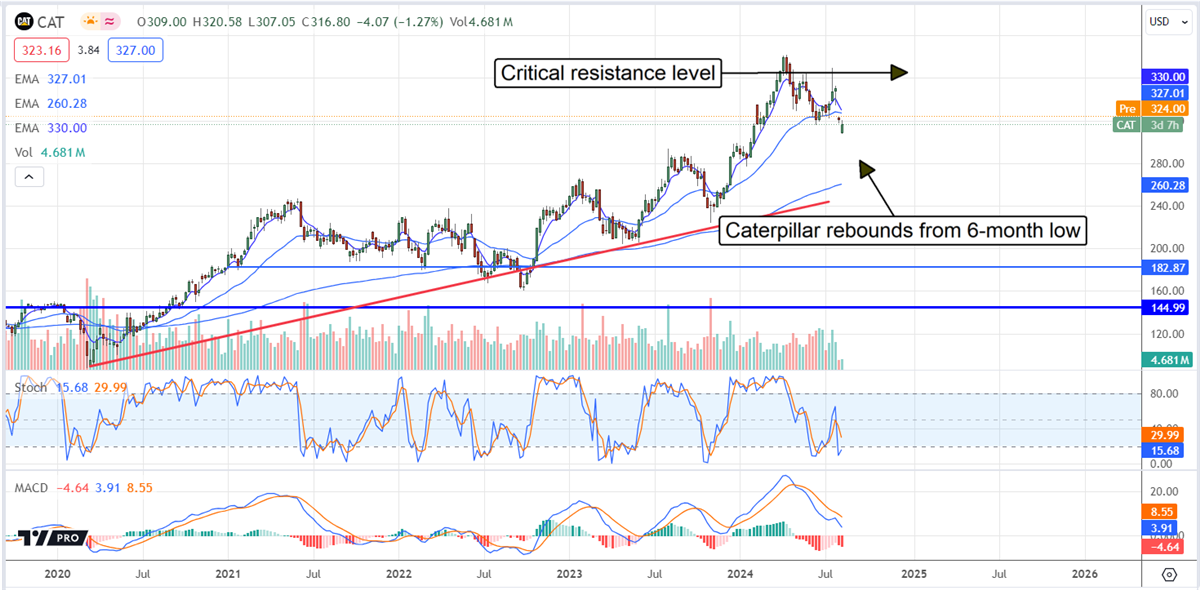
Caterpillar’s (NYSE: CAT) stock price was not immune to the threat of recession, but its Q2 results disprove the idea that the global economy is on the brink now. The report highlights outperformance on the top and bottom lines driven by sequential improvements in all segments and regions.
The company is still in contraction compared to last year’s figures, but a return to growth is expected by the end of the year, and now, a budding tailwind is strengthening. The July NFP report suggests weakening in the US labor market, enough to spur the FOMC to cut rates sooner or more aggressively than the market had been pricing. Lower rates will catalyze global spending projects from public to private sectors relying on Caterpillar’s industrial products and services.
Caterpillar Crawls Higher After Better-Than-Expected Q2 Results
Caterpillar is not out of the weeds yet, but the Q2 results suggest it is working through the pullback and setting up for a solid year in 2025. The company reported $16.69 in net revenue, a decline of 3.5% that outpaced the consensus by a slim ten basis points, with the real strengths showing up on the bottom line. The company reports sales are down YOY in two segments, Construction and Resources, offset by a gain in Energy & Transportation. Regionally, North America and Latin America were strongest, up 1% and 5%, offset by YOY declines in EMEA, Asia, and External Sales.
Regarding volume and pricing, volume is down and offset by pricing realization, with a bonus. The bonus is that volume declines are associated with declining dealer inventory levels, setting the company up for an inventory build next year. Pricing is a critical factor because it impacts the bottom line, helping to improve the adjusted operating margin by 110 basis points and to a level above consensus. The takeaway is that GAAP earnings are down on one-offs, but the adjusted EPS of $5.99 is up 8% YOY despite the weakened sales volume, with margin strength expected to stick.
Cash flow is another critical detail for investors, allowing for robust capital returns. Caterpillar produces solid cash flow, and Q2 is no different. The company reported $3 billion in operating cash flow, 17.9% of revenue, and returned most of it to shareholders. Capital returns in Q2 included $0.6 billion in dividends and $1.8 billion in share buybacks, which reduced the average share count by 4.95% for the quarter.
The balance sheet is also healthy, with only one red flag: the reduction in shareholder equity, which is ultimately a red herring. The decline in equity is due entirely to an increase in treasury shares (the result of buybacks), which more than offsets the decline. Investors can expect capital returns to continue because the company shows traction in the sequential results, and a return-to-YOY growth is expected soon.
Analysts Are Driving Caterpillar Stock Higher
The analysts' activity in 2024 is tepid, and Marketbeat tracks no revisions in the first few hours following the Q2 release, but the trend in sentiment is bullish and unlikely to change. The analysts have been initiating targets, lifting sentiment, and raising price targets, leading this stock to a range above the consensus estimate. The consensus is about 3% above the post-release price action, aligning with recent support levels, and most of the fresh targets are new all-time highs.
Price action is bullish. The market is rebounding from recent lows due to the company’s inherent strengths and set up to return to the top of a recent trading range. A move to the top of the range would put this market above the consensus target and on track for a new high, which may be reached before the year’s end. The outlook for new highs will improve if analysts issue positive updates or revisions; gains will likely be capped at the range top if the Q2 results do not inspire the analysts.





